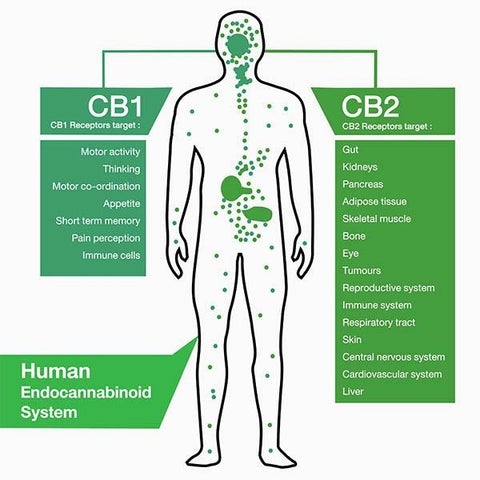
What is the Endocannabinoid System?
Everyone has an endocannabinoid system which is the body’s complex internal cell-signalling system. This system plays a role in regulating a range of functions and processes.
Scientific research has linked the endocannabinoid system:
- Appetite and digestion
- Metabolism
- Chronic pain
- Inflammation and other immune system responses
- Mood
- Learning and memory
- Motor control
- Sleep
- Cardiovascular system function
- Muscle formation
- Bone remodelling and growth
- Liver function
- Reproductive system function
- Stress
- Skin and nerve function
These functions all contribute to homeostasis, which refers to stability of your body’s internal environment. For example, if an outside force, such as pain from an injury or a fever, throws off your body’s homeostasis, your Endocannabinoid System kicks-in to help your body return to its ideal operation.
Your endocannabinoid system involves 3 main components:
- Endocannabinoids (Anandamide - full name N-Arachidonoylethanolamine) and 2-AG (full name 2-Arachidonoylglycerol)
- Receptors
- Enzymes
The receptors are found throughout your body. Endocannabinoids (along with plant derived terpenes) bind to the endocannabinoid system receptors in order to signal that the endocannabinoid system needs to take action.
There are two main receptors in the endocannabinoid system:
- CB1 receptors, which interact with the brain and are mostly found in the central nervous system; and
- CB2 receptors, which interact with the muscles and organs and are mostly found in the peripheral nervous system and the immune cells.
Endocannabinoids (and plant derived terpenes) can bind to either receptor and the effects that result depend on where the receptor is located and which endocannabinoid it binds to.
For example, endocannabinoids, cannabinoids and terpenes might target CB1 receptors in a spinal nerve to relieve pain. Others might bind to CB2 receptors in your immune cells to reduce inflammation, which is a common sign of autoimmune disorders.
What are Terpenes?
Terpenes are chemicals naturally found in plants including cannabis. They contribute to the smell and flavour of plant-based foods. Natural plant terpenes are used as flavourings and fragrances in foods, cosmetics, perfumes and wellness products.
Terpenes have a wellness effect by acting on the body’s own endocannabinoid system. The endocannabinoid system is a complex network of cell receptors that work as chemical messengers. Terpenes are known to interact with the CB1 receptors (located mostly in the brain and central nervous system) and the CB2 receptors (mostly located in the gut, muscle, joints, skin and other organs).
Research shows that terpenes may contribute to wellness as part of healthy lifestyle management. The common wellness effects include, improvements in physical aches and tension, balancing mood and calmness, controlling appetite, sharper thinking, and supporting restlessness, anxiety and sleep.
Source: ECS Botanics





